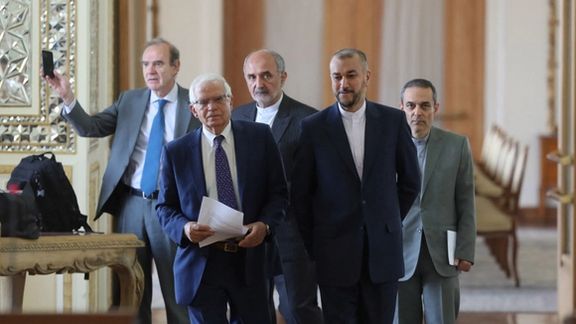Iran Reviews Latest US Offer As Israel Leader Pledges Action

Iran has received and is assessing the latest United States input over restoring the 2015 nuclear agreement, the foreign ministry spokesman said Wednesday.

Iran has received and is assessing the latest United States input over restoring the 2015 nuclear agreement, the foreign ministry spokesman said Wednesday.
“A precise review of the views of the American side has begun,” Nasser Kanaani told the official news agency IRNA. “The Islamic Republic will after the competition of this examination pass on its opinions to the coordinator.”
The European Union, which has coordinated 16-month talks between Iran and world powers over reviving the 2015 agreement, circulated August 8 what its officials called a “final text” designed to overcome remaining differences between Tehran and Washington. Iran responded August 15.
Various reports and anonymous briefings have suggested that remaining challenges concern Tehran’s request for guarantees, over both sanctions and its nuclear program, should the US leave a revived deal, just as it in 2018 abandoned the original agreement, the JCPOA (Joint Comprehensive Plan of Action).
Iran has also stressed an expectation that the International Atomic Energy Agency drop enquiries into nuclear work carried out before 2003, which it says were revived at the behest of Israel, whose leaders have consistently opposed the JCPOA.
‘$100 prize for breaking commitments’
Following recent reports of Israel ramping up behind-the-scenes efforts against further diplomacy, Prime Minister Yair Lapid Wednesday made a strident attack on the JCPOA. He told a press briefing that reviving the agreement, which President Donald Trump left in 2018, would “give Iran a hundred billion dollars a year…[to] spread terror around the globe.” This money, a “prize for [the Iranians] breaking all of their commitments,” would lead to increased support, he said, for Palestinian groups and Hezbollah in Lebanon.

Israel supported Trump’s imposition in 2018 of ‘maximum pressure’ sanctions, which threatened punitive action against third parties buying Iranian oil or dealing with its financial sector – measures that would be lifted with a revived JCPOA in return for intrusive international inspections and resumed restrictions on Iran’s nuclear program.
Lapid mocked the EU for making “what they called their ‘final offer’ for a return to the nuclear deal.”
“The Iranians, as always, did not say no,” Lapid said. “They said ‘Yes, but…;’ And then they sent a draft of their own, with more changes and demands…This is not the first time this has happened. The countries of the West draw a red line, the Iranians ignore it, and the red line moves.”
Lapid claimed a revived JCPOA would not “meet the standards set by President Biden himself: preventing Iran from becoming a nuclear state.” He alleged it would endanger the independence of the International Atomic Energy Agency but putting it under “political pressure” to “close open cases,” an apparent reference into the IAEA probe into Iran’s pre-2003 nuclear work.
No agreement obligates Israel
The Israeli prime minister called President Joe Biden, who came to office in 2021 pledging to revive the JCPOA, “one of the best friends Israel has ever known” with whom Israel had “an open dialogue...on all matters of disagreement.” Lapid said he had urged the leaders of France, Germany and the United Kingdom to break off talks with Iran.
The Israeli premier added that no agreement reached by world powers would “obligate Israel,” which would “act to prevent Iran from becoming a nuclear state.” Israel is widely thought responsible for attacks on Iranian nuclear sites and for killing nuclear scientists.
In an interview with an Israeli radio station on Wednesday, former Israeli military intelligence chief, Tamir Hayman, joined other former officials in arguing JCPOA restoration was “the lesser of two evils.” Hayman said it would hold back Iran from being a nuclear threshold state until at least 2030, when some JCPOA restrictions would expire.